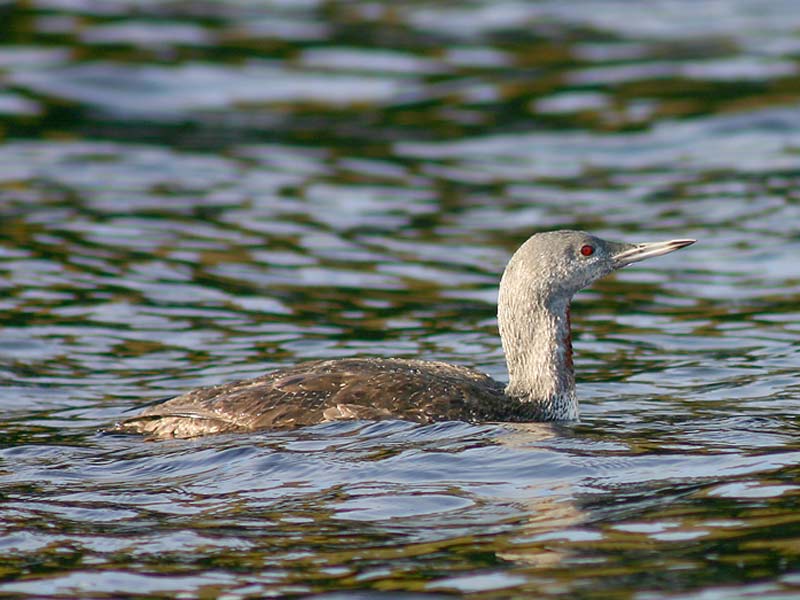Red-throated diver (Gavia stellata)
Distribution data supplied by the Ocean Biodiversity Information System (OBIS). To interrogate UK data visit the NBN Atlas.Map Help
| Researched by | Natalie Sweet | Refereed by | Admin |
| Authority | (Pontoppidan, 1763) | ||
| Other common names | - | Synonyms | - |
Summary
Description
Recorded distribution in Britain and Ireland
Breeding pairs occur in northwest UK and Ireland, with significant numbers on Shetland, Orkney, the Outer Hebrides and mainland Scotland.Global distribution
-Habitat
Gavia stellata is a coastal species in winter when substantial numbers arrive from northern regions such as Greenland, Iceland and Scandinavia. Very ungainly on land, these birds only come ashore to breed. Typical breeding habitat is around small waterbodies within open moorland. Red-throated divers feed mainly on fish which are caught by diving from the surface.Depth range
-Identifying features
- Bill slightly uptilted.
- In summer throat and upperparts grey with a dark red patch on neck.
- In winter, extensive white on neck, face and around the eye.
- Paler and more mottled upperparts than other divers.
- Slimmer build than other divers.
Additional information
Also known as the red-throated loon.Listed by
Bibliography
Datasets
Argyll Bird Club, 2017. Bird records for Argyll for the years 2002 and 2003. Occurrence dataset: https://doi.org/10.15468/uilybi accessed via GBIF.org on 2018-09-25.
Bristol Regional Environmental Records Centre, 2017. BRERC species records recorded over 15 years ago. Occurrence dataset: https://doi.org/10.15468/h1ln5p accessed via GBIF.org on 2018-09-25.
Bristol Regional Environmental Records Centre, 2017. BRERC species records within last 15 years. Occurrence dataset: https://doi.org/10.15468/vntgox accessed via GBIF.org on 2018-09-25.
British Trust for Ornithology, 2018. Birds (BTO+Partners). Occurrence dataset https://www.bto.org/ accessed via NBNAtlas.org on 2018-09-25.
British Trust for Ornithology, 2018. BTO First Atlas of Breeding Birds in Britain and Ireland: 1968-1972. Occurrence dataset: https://www.bto.org/ accessed via NBNAtlas.org on 2018-09-25.
British Trust for Ornithology, 2018. BTO First Atlas of Wintering Birds in Britain and Ireland: 1981/82-1983/84. Occurrence dataset: https://www.bto.org/ accessed via NBNAtlas.org on 2018-09-25.
British Trust for Ornithology, 2018. BTO First Atlas of Wintering Birds in Britain and Ireland: 1981/82-1983/84. Occurrence dataset: https://www.bto.org/ accessed via NBNAtlas.org on 2018-09-25.
Cambridgeshire & Peterborough Environmental Records Centre, 2017. CPERC Combined Dataset. Occurrence dataset: https://doi.org/10.15468/npthhv accessed via GBIF.org on 2018-09-25.
Cofnod – North Wales Environmental Information Service, 2018. Miscellaneous records held on the Cofnod database. Occurrence dataset: https://doi.org/10.15468/hcgqsi accessed via GBIF.org on 2018-09-25.
Cumbria Biodiversity Data Centre, 2018. Tullie House Museum Natural History Collections. Occurrence dataset: https://doi.org/10.15468/epewfs accessed via GBIF.org on 2018-09-25.
Environmental Records Information Centre North East, 2018. ERIC NE Combined dataset to 2017. Occurrence dataset: http://www.ericnortheast.org.ukl accessed via NBNAtlas.org on 2018-09-38
Fife Nature Records Centre, 2018. Fife Nature Records Centre combined dataset. Occurrence dataset: https://doi.org/10.15468/ccc1ip accessed via GBIF.org on 2018-09-27.
Fife Nature Records Centre, 2018. St Andrews BioBlitz 2014. Occurrence dataset: https://doi.org/10.15468/erweal accessed via GBIF.org on 2018-09-27.
Greater Manchester Ecology Unit, 2018. Bird Records held by Greater Manchester Ecology Unit. Occurrence dataset: https://www.tameside.gov.uk/ecologyunit accessed via NBNAtlas.org on 2018-09-27.
Isle of Wight Local Records Centre, 2017. Isle of Wight Notable Species. Occurrence dataset: https://doi.org/10.15468/sm4ety accessed via GBIF.org on 2018-09-27.
John Muir Trust, 2017. Species Records for John Muir Trust Properties 2007-2009. Occurrence dataset: https://doi.org/10.15468/p5lw5z accessed via GBIF.org on 2018-09-27.
John Muir Trust, 2017. Species Records for John Muir Trust Properties Nevis, Sandwood, Quinag and Schiehallion 2010.. Occurrence dataset: https://doi.org/10.15468/n9dwn0 accessed via GBIF.org on 2018-09-27.
Lancashire Environment Record Network, 2018. LERN Records. Occurrence dataset: https://doi.org/10.15468/esxc9a accessed via GBIF.org on 2018-10-01.
Leicestershire and Rutland Environmental Records Centre, 2017. Leicestershire and Rutland Protected and Conservation Priority/BAP Specie. Occurrence dataset: https://doi.org/10.15468/7ve2nt accessed via GBIF.org on 2018-10-01.
Manx Biological Recording Partnership, 2018. Isle of Man historical wildlife records 1995 to 1999. Occurrence dataset: https://doi.org/10.15468/lo2tge accessed via GBIF.org on 2018-10-01.
Manx Biological Recording Partnership, 2022. Isle of Man historical wildlife records 1990 to 1994. Occurrence dataset:https://doi.org/10.15468/aru16v accessed via GBIF.org on 2024-09-27.
Merseyside BioBank., 2017. Merseyside BioBank (verified). Occurrence dataset: https://doi.org/10.15468/ar0p6s accessed via GBIF.org on 2018-10-01.
National Trust, 2017. National Trust Species Records. Occurrence dataset: https://doi.org/10.15468/opc6g1 accessed via GBIF.org on 2018-10-01.
NBN (National Biodiversity Network) Atlas. Available from: https://www.nbnatlas.org.
Norfolk Biodiversity Information Service, 2017. NBIS Records to December 2016. Occurrence dataset: https://doi.org/10.15468/jca5lo accessed via GBIF.org on 2018-10-01.
North East Scotland Biological Records Centre, 2018. North East Scotland Birds (1883-2010). Occurrence dataset: https://doi.org/10.15468/o1okcz accessed via GBIF.org on 2018-10-01
OBIS (Ocean Biodiversity Information System), 2025. Global map of species distribution using gridded data. Available from: Ocean Biogeographic Information System. www.iobis.org. Accessed: 2025-08-08
Record, 2017. RECORD Aves Data. Occurrence dataset: https://doi.org/10.15468/pudf3y accessed via GBIF.org on 2018-10-01.
Rotherham Biological Records Centre, 2017. Rotherham Biological Records Centre - Non-sensitive Records from all taxonomic groups. Occurrence dataset: https://doi.org/10.15468/d3tufo accessed via GBIF.org on 2018-10-02.
Sheffield Bird Study Group, 2017. Sheffield Bird Study Group (Yorkshire records). Occurrence dataset: https://doi.org/10.15468/ytwnad accessed via GBIF.org on 2018-10-02.
South East Wales Biodiversity Records Centre, 2018. SEWBReC Birds (South East Wales). Occurrence dataset: https://doi.org/10.15468/qfainq accessed via GBIF.org on 2018-10-02.
South East Wales Biodiversity Records Centre, 2018. Dr Mary Gillham Archive Project. Occurance dataset: http://www.sewbrec.org.uk/ accessed via NBNAtlas.org on 2018-10-02
Staffordshire Ecological Record, 2017. SER Species-based Surveys. Occurrence dataset: https://doi.org/10.15468/q8qen3 accessed via GBIF.org on 2018-10-02.
Suffolk Biodiversity Information Service., 2017. Suffolk Biodiversity Information Service (SBIS) Dataset. Occurrence dataset: https://doi.org/10.15468/ab4vwo accessed via GBIF.org on 2018-10-02.
The Wildlife Information Centre, 2017. LWIC - Local Patch Project. Occurrence dataset http://www.wildlifeinformation.co.uk/. Accessed via NBNAtlas.org/ on 2018-10-02.
The Wildlife Information Centre, 2017. Natalie Harmsworth's Records (2010-2016). Occurrence dataset http://www.wildlifeinformation.co.uk/. Accessed via NBNAtlas.org/ on 2018-10-02.
West Wales Biodiversity Information Centre, 2017. WTSWW Data: All Taxa (West Wales). Occurrence dataset: https://doi.org/10.15468/gaakk2 accessed via GBIF.org on 2018-10-02.
Citation
This review can be cited as:
Last Updated: 22/09/2008



